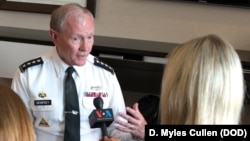A military budget squeeze.
Russian aggression in Ukraine.
The rise of the Islamic State group.
Those are the crises that shaped U.S. Gen. Martin Dempsey’s four years as the 18th Chairman of the Joint Chiefs of Staff.The Chairman is the president's top military adviser.
Budget crunch
In a VOA interview, Chairman Dempsey said Congress cut the budget during his tenure in ways that were wildly unpredictable.
“Uncertainty is almost as dangerous to national security as the size of the budget itself,” he said. “We have not made much progress on that frankly, so that is not a part of my legacy of which I am particularly proud.I wish we could have made more progress on that.”
When Dempsey steps down on October 1, many will debate his advice to the president on how to handle Russia and the Islamic State group.
Russian resolve
Some critics have suggested the United States’ posture abroad emboldened Russian President Vladimir Putin to annex Ukraine’s Crimea peninsula. Others, however, feel a nuclear superpower as strong as the Russian bear should not be provoked.
Dempsey led a military strategy that trained Ukrainian forces without providing them lethal arms.Ukraine is considered a U.S. ally, but is not a member of NATO.
“I hope that Russia sees what’s happening in Ukraine, sees the price that Russia has paid due to sanctions and isolation as a consequence of the aggression in Ukraine and will rethink it," U.S. Defense Secretary Ash Carter said after meeting at the Pentagon with Ukrainian Defense Minister Colonel-General Stepan Poltorak.
NATO allies, especially Estonia, Latvia, Lithuania and Poland, have been reassured by an increased U.S. presence in eastern Europe, boosted under Dempsey’s watch.The U.S. military has sent troops, convoys of striker vehicles and even A-10 ground attack aircraft to the region.
“I would actually give him some credit for helping organize a response that has been firm enough to get Putin’s attention, but not to pour gasoline on the fire,” said Michael O’Hanlon, a defense expert at The Brookings Institution and author of a new book, "The Future of Land Warfare."
Islamic State
On the Middle East, however, O’Hanlon calls Dempsey’s record “fairly spotty,” saying the U.S. allowed several Arab Spring countries from Libya to Syria to devolve into chaos.Other experts have also been critical of the military’s strategy against Islamic State militants in Iraq and Syria.
“Some elements of the right strategy are in place, but several are under-resourced, while others are missing,” according to former CIA director David Petraeus, who served as commander of U.S. Central Command from 2008-2010 and commanding general of coalition forces in Iraq from 2007-2008.
“We are not where we should be at this point,” he told the Senate Armed Services Committee Tuesday.
National security hawks in Congress have pushed for a stronger military response. Dempsey, however, tells VOA he has encouraged a conversation about the proper use of military power, which he believes should be used in conjunction with diplomacy and other elements of national power.
“We have to think our way through our security challenges, not bludgeon our way through them,” he said. “And I hope part of my legacy is the phrase ‘make it matter,’ because the use of the military instrument is extraordinarily complex and shame on us if we allow it to be a simple answer to a complex problem.”




